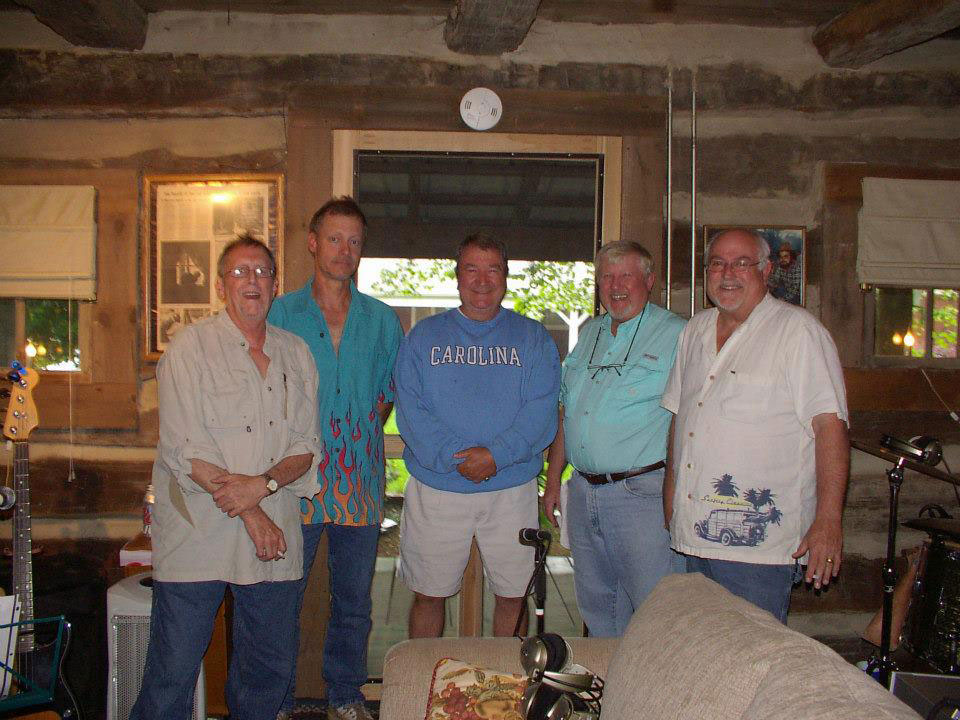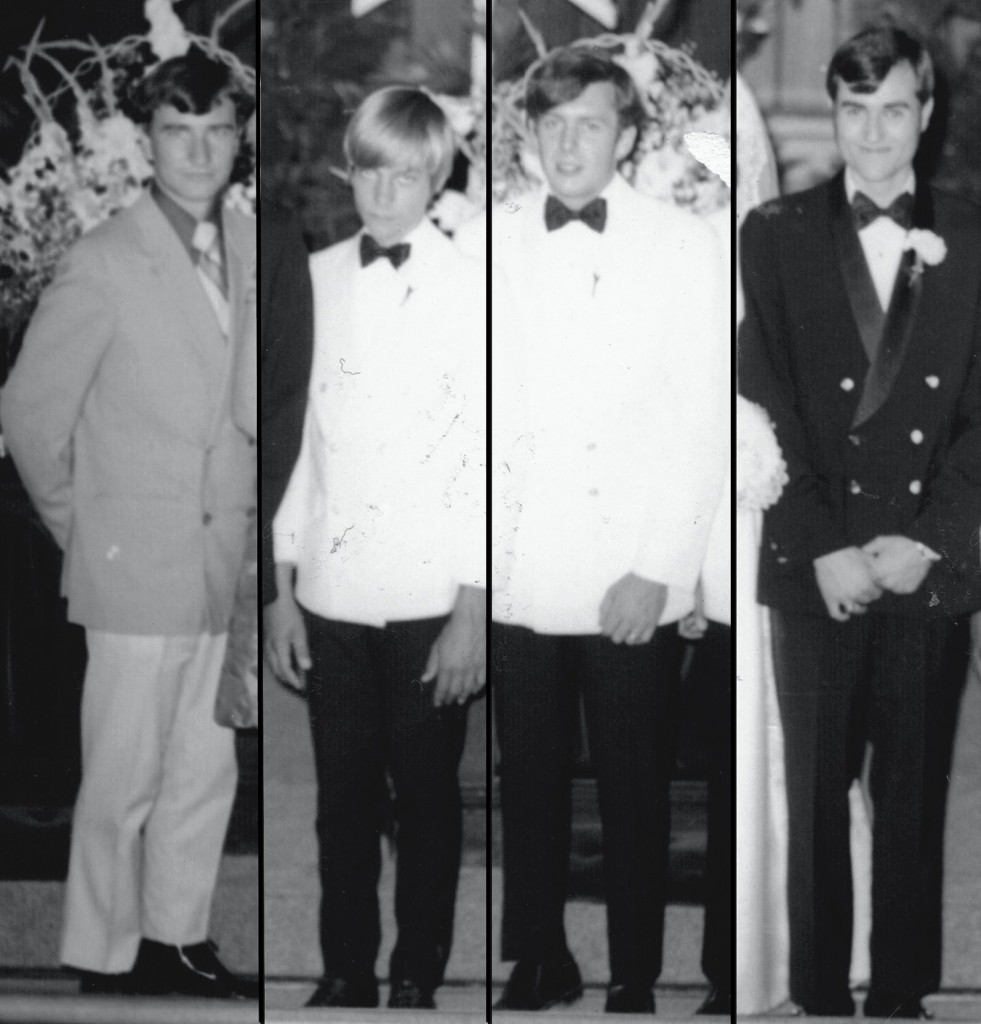
Jack Garrett unveils the story behind the mystery group from North Carolina:
Have you ever been to Ruffin, N.C.? Probably not, but if you traveled there around 1967, you just might have heard the sounds of a psychedelic/soul band that managed to play together with the same personnel for 6 years.
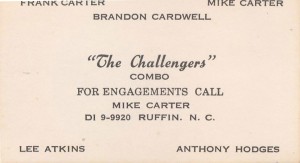
The band is remembered today as the IV Pak and the mystery surrounding the elusive group begins with their name. The group, whose psychedelic rave-up “Whatzit?” appears on numerous garage comps (Signed DC, Teenage Shutdown #8, Aliens, Psychos & Wild Things #3), has gone under the radar screen for decades because they never performed under that name. A label misprint on their lone 45 mistakenly lists the artists as the IV Pak, instead of the VI Pak. Bassist Anthony Hodges explains that the four-piece group had recently expanded to include trumpet and sax players and the members decided they would “just be the VI Pack, like a six pack of beer.”
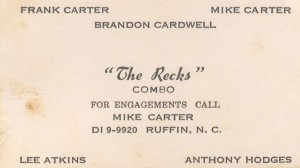
The group started in 1965 as the Challengers and included Mike Carter on guitar, first-cousin Frank Carter on keyboards, bassist Anthony Hodges and drummer, Brandon Cardwell. The quartet performed for two years as the Challengers, then briefly as the Recks before adding sax man Lonnie Bowes and trumpet player Sidney Vernon and christening themselves as the VI Pak. They were based on the borders of Caswell and Rockingham Counties in North Carolina, with half the members at Bartlett-Yancey High School in Yanceyville and the others attending Ruffin High School.
Brandon lived nearby but was much younger than the others. He joined the Challengers at age 10, but was already an accomplished drummer.
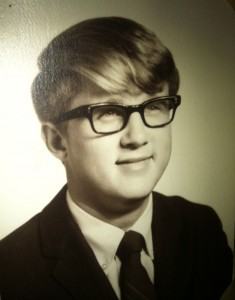
Sax man Lonnie Bowes recalls that the school band had just started a year or so prior to the group’s formation and the members all knew each other through school. He explains that “Mike had a good ear for music and Frank could read music real well (so) we just all fell together pretty good.”
Mike and Frank were the unofficial leaders. The cousins both started on guitar and a shared Silvertone amp purchased at Haynes Pawn Shop in Danville for $70. Frank quickly gravitated to keyboards and his dad bought him an inexpensive Italian organ. Anthony and Brandon were recruited and the line-up was set. The four shared a love for the Animals, Stones and the Beatles, although Brandon admits vocals were a chore, since “we didn’t have anybody (who) could sing like John or Paul.”
After learning “Wooly Bully” and “House of the Rising Sun”, the Challengers performed live for the first time in Oct. of ’65 for a dance at the Casville Volunteer Fire Department in Caswell County, N.C. More gigs followed at parties, pizza parlors, church socials, VFW posts and the local Moose and Elk’s lodges. Within months, the band competed in a battle of the bands at Williamsburg Elementary School in Reidsville, losing out to the better-equipped Checkmates.
The bass player’s father ran the local music store and provided their Fender Showman amps.
Another early performance was in the tiny town of Quick, where the Challengers played for Pam Hodges’ 15th birthday party. Hodges would go on to marry legendary bluegrass guitarist Tony Rice.
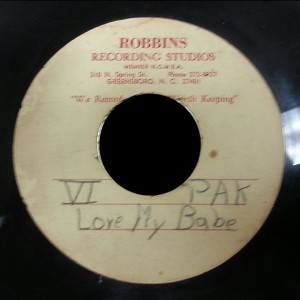
The group played once in Danville as the Recks before adding horns and becoming the VI Pak. The addition allowed the band to play a mixture of rock and soul, opening doors on the North Carolina beach circuit.
It was 1966 and the members of the VI Pak were anxious to get into the studio and record. Anthony had written a mid-tempo rocker, “Love My Babe,” and a crude recording was made at Danville’s House of Sound Studios after the bassist and guitarist approached producer Frank Koger at the local K-Mart, where he worked his day job running the electronics department. A half-dozen copies of an acetate were pressed featuring the original song and the band’s theme, an instrumental which borrowed heavily from “Wipe Out” and “Batman.” It was their first time in the studio and Brandon was nervous, kicking the song off at breakneck speed. The band kept pace, with Mike serving up a blistering guitar solo and Brandon bashing away on the drums.
The demo was played a couple of times on the local Top 40 station, but it would be the following year before the VI Pak would get the break they needed to actually press a record.
That break came in the summer of ’67 during a two-day battle of the bands at Ballou Park Shopping Center in Danville. Hosted by popular deejay Glenn Scott, some of the best bands in the region competed on three flatbed trucks in the shopping center’s parking lot. At the end of the first day’s competition, the VI Pak had won the preliminary round and a free recording session at Koger’s Raven Records. The grand prize went to the Fabulous Generals of Martinsville, Va., who wore matching suits and were fronted by a pretty (and talented) female vocalist, Debra Carol Crowder.
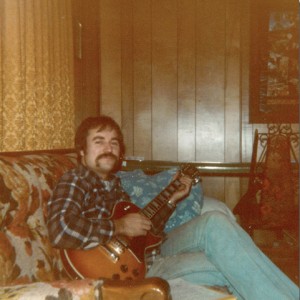
At 17, Frank Carter was the oldest member of the band and remembers selecting a Booker T. and the MG’s song, “Boot-Leg,” to record because it featured the brass and “had a neat little organ part in the center of it, that Booker T. did.” It also helped that the band knew the soul song and performed it regularly. Frank recalls that the band had originally planned to record at Robin’s Records in Greensboro, “but they wanted more money over there.”
The House of Sound studio was located on Piney Forest Road in Danville, in the same building that Mike’s uncle — E.C. Gerringer — owned and used for a piano and furniture company.
The guys crammed all of their instruments and amps into the trunk of Frank’s ’63 Chevy and headed for the studio. Frank remembers it as a “pretty neat little studio (with) multi-tracking and cubicles so “that each one of us had our own little box to play in. It wasn’t like playing in one big room, everything was sort of sectioned off for the drummer and for the guitarist and the horns and myself.”
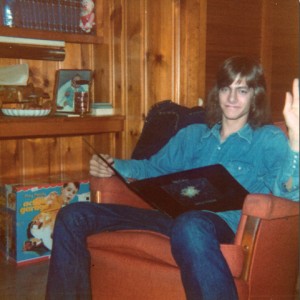
“Boot-Leg” was knocked out in short order, but the band wasn’t prepared when Koger said:
“Well, what are you gonna put on the other side of this?”
The band decided to record another cover as the flip and had attempted several takes before Koger threw up his hands in frustration and called for a different number. Brandon explains that the band “did ‘Boot-Leg’ and we knew that was gonna be the A-side and that turned out really decent and we had planned on putting ‘Ferry Across the Mersey’ by Gerry and the Pacemakers on the B-side.” Brandon says the band “did it as good as we’d ever done it and I don’t know what happened but right near the end of the song our trumpet player — who was playing the lead in it — hit a sour note. And we were doing it instrumental… and he hit a sour note, so we were just blown away. Not that we didn’t have any more studio time, but we just messed around with ‘Whatzit?,’ which was a takeoff on ‘Psychotic Reaction,’ of course, and we just wound up putting that on the record instead.”
Frank recalls that the band hadn’t played “Psychotic Reaction” more than a couple of times, but Koger suggested that they rework it for the session.
Anthony, who sings the lead vocal, sat down and penned a couple of quick verses before the tape started rolling.
She had a cute mini-skirt with a little bit o’ tease, you can see six inches above her knees.
I’m just like a man, can’t stand the attraction. She leaves me with a psychotic reaction.
Looks so good I’d like to eat her, psychotic reaction every time I meet her.
Five-foot-two and built for action, 98 pounds of psychotic reaction.
Frank explains that, like Psychotic Reaction, “we had to do something in middle of this thing. So, that’s when we just put this organ sound in the center of it and I was using an old Sears Silvertone amplifier with a Doric organ. And the (effect) on it was just sort of cheap reverb I guess you’d say. Anyway, it sounded very sort of outer space. So we put that in it.”
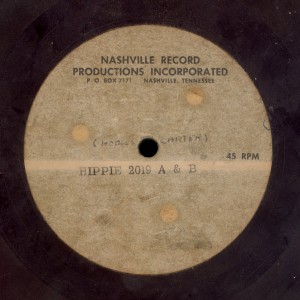
Brandon dropped a beat as he was coming back from the break but recovered, although Frank says he “had to do a little bit of catching up.” He believes Koger “had to edit out maybe a drum beat or so in the process, but anyway that turned out to the song that people played.”
The drummer’s recollection is a little different. He wanted to re-record “Whatzit?” because “there was a major mess up on my part about middle ways into the song… it was just a real bad off time thing I did and luckily I stumbled right back into beat. I really didn’t like that cut because of that.” In retrospect, he doesn’t know why the band didn’t just stop and take it from the top. And when they listened to the playback, Brandon says he couldn’t understand “why we even kept it on the tape, because Frank Koger would back it up and record over the same tape usually… didn’t do it that time.” He says the consensus was that the song was only a B-side and no one would ever hear it.
With the song in the can, a title was needed. The band had just composed it and had no idea what to call the tune. After a short discussion between the band and Koger in the control room and after listening to the tape together, Koger said: “I don’t know what it is, so why don’t we just call it ‘Whatzit!'”
Anthony believes his vocal part was double-tracked by Koger, although Mike insists he sang in unison with the bass player. Either way, the snarling vocal makes the record. Both sides were recorded in about two hours.
Now that the sessions were complete, Koger approached the band about a label. Frank remembers the producer wanted an extra $20 to release it on Raven Records, explaining that the Soulmasters were riding high on the success of their first single, “I’ll Be Waiting Here.” The members were listening to the playback in the control room and “between us we might’ve had 10 bucks that night, because we really hadn’t planned on doing anything extra and we were scared to death we might not come out with anything” after paying Koger their $50 in prize money. The band balked and insisted on their own label, choosing Hippie Records because, as Anthony explains, “We all wanted to be hippies back then (and) grow our hair long.”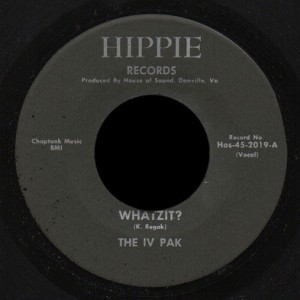
The master tapes were sent off for pressing and the band was in for another surprise when their records arrived. Somewhere along the way, the Roman numerals had been inverted and the VI Pak had become the IV Pak. With 500 mislabeled copies, the band began distributing the 45. Mike went by the studios to retrieve the records and recalls that “each box had 20 or 25 records and I believe each one of us received about four boxes. We would just take those and try and sell them individually. And if we knew of anybody at a radio station we could take them to, we’d do that, but I don’t remember anywhere I distributed them to except at school and relatives.”
The band’s name wasn’t the only bone of contention. Rather than credit Anthony Hodges as lyricist, Koger listed himself as songwriter, although he spelled his name backwards. Anthony remains unhappy about the slight to this day, but rationalizes that “it didn’t go anywhere, so he didn’t get much money from it.”
Frank recalls hearing the song played in Reidsville and on WYPR and WBTM in Danville and believes there may have been a second pressing.
The record’s release led to more bookings but also confusion about how the band should bill itself. Most promoters knew the band as the VI Pak, but the attention generated by the record resulted in more requests for the IV Pak to play parties, The Black Horse Cellar and Torch clubs, and even the coveted Coke plant dance in Danville, which attracted hundreds of teens every weekend.
The group soldiered on as the VI Pak another three years, performing throughout their home state and Southside Virginia and expanding their repertoire to include numbers by Eric Clapton, Vanilla Fudge and the Rolling Stones. Performances were more sporadic after 1968, with Frank, Sidney, Anthony and Lonnie away at college. The group parted ways in ’71 when Anthony joined the Air Force and several of the members married.
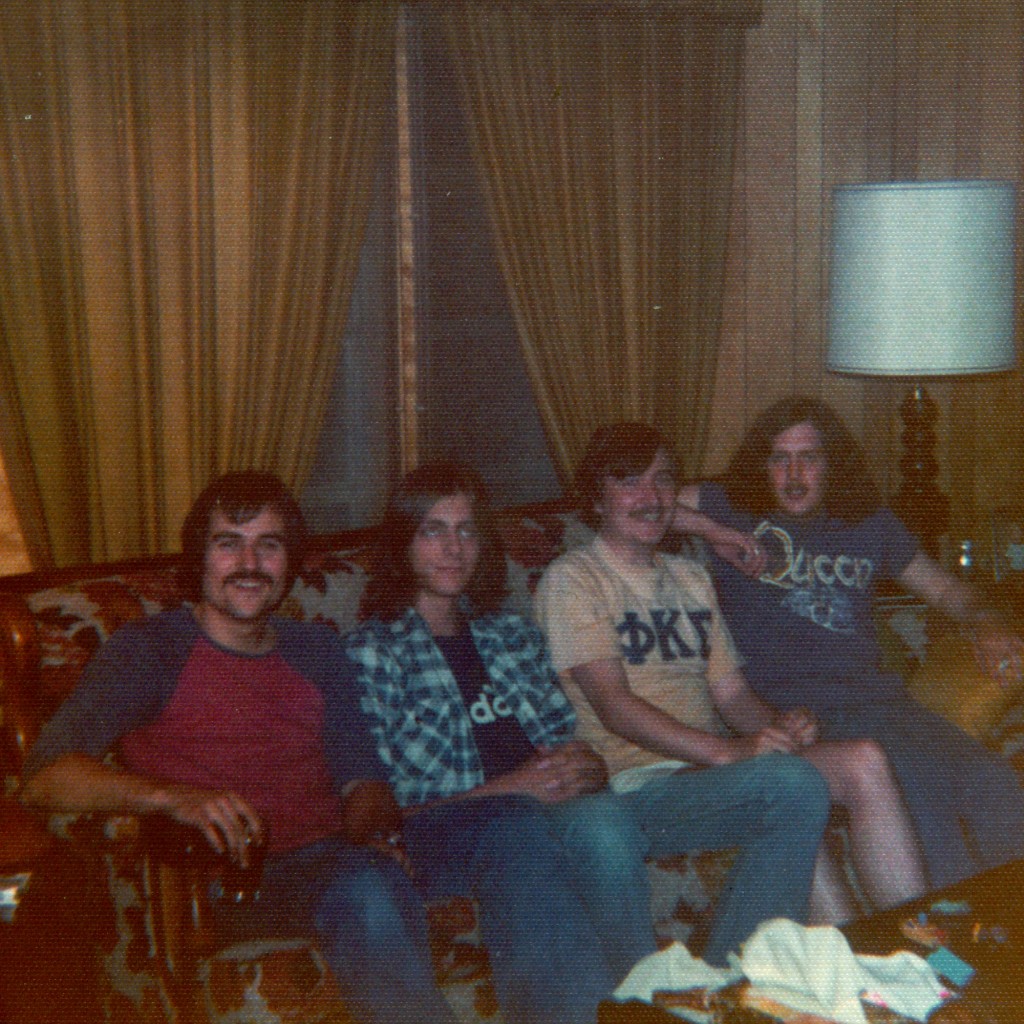
A brief reunion followed in 1989, when the band came together for a one-off performance at Ruffin’s Whistlestop Jubilee in late November. As fate would have it, it snowed that morning and the concert was cancelled.
Trumpeter Sidney Vernon died in 2008 at the age of 59. After graduating from high school, he attended Western Carolina University and discovered pottery. Sid and his wife later moved to Virginia Beach, where he taught ceramics and started Vernon Pottery, making 1/12th scale reproductions of 19th century salt-glazed stoneware. He was acknowledged by the International Guild of Miniature Artisans for his skill as a potter and awarded “Fellow” status. His work has been featured in numerous magazines and found its way to collectors around the world.
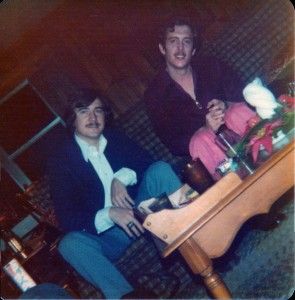
While in the Air Force, Mike Carter played in the Hands of Time, then joined the Ed Irvin Band and Patchwork. He spent eight years as guitarist for the Atlantis Band, where he wrote the song “Shagging By The Seaside,” which the group recorded for Pyramid Records in Charlotte in 1986. He took an 18-year hiatus before returning to music in 2006 with the Not Dead Yet Blues Band. He currently performs with bassist “Wild” Bill Moore in A Cup of Blues.
Lonnie Bowes played in several bands after the VI Pak but is semi-retired and hasn’t touched his horn in years. He now runs a small DMV office in Yanceyville, N.C.
After the VI Pak, Anthony Hodges did a tour of duty in Vietnam. On his return stateside, he went to work for the N.C. Department of Corrections. He has since retired from prison work and music, although he sings in his church choir and still lives in Ruffin.
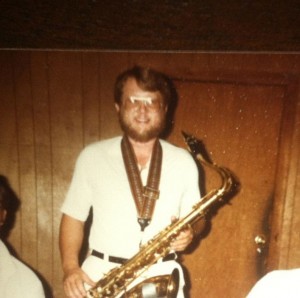
Brandon Cardwell is still active in music and plays classic rock and country every weekend in the house band at the Barn Dance in Julian, N.C. His drumming is also featured on 80’s albums by The Paul Roberts Band and Lady and the Gamblers. He then played with Kerry Michaels and the Mitch Snow bands through the mid-90s, followed by a stint with Bob Collins and the Fabulous Five. His day job was at Burlington Industries.
Frank Carter traded his Doric organ for a Vox, which he still has today. He likes to record on his Korg M3 and is currently working on a musical on Judas Iscariot and the plot to kill Jesus. He worked for a number of years in television and as a public school teacher before earning his Master’s and teaching photography and communications at Alamance and Cape Fear Community Colleges. Frank retired as chairman of the Humanities and Fine Arts Department at the Wilmington college in May of 2012. His wife is a doctor and a drummer.
The surviving members all live in North Carolina and still keep in touch. They reunited in Spring, 2013 and Mike hopes to record the band in his home studio.
